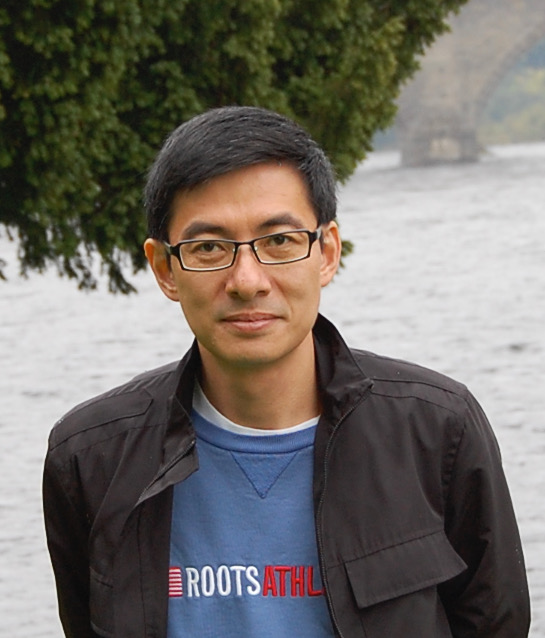“He Has Amazing Eyes”
Interview with Ustad Zakir Hussain (9 March 1951 – 16 December 2024) published in The Rajneesh Times Intl on 16 March 1988
Ustad Zakir Hussain has played in two concerts in Rajneeshdham [now called Osho International Meditation Resort, ed. ON] recently. His performances have shown a mastery of the tablas that successfully defies description. When listening to him, it is virtually impossible to not understand what Bhagwan [later called Osho] means when he calls music the closest thing to meditation.
In Gautama the Buddha Auditorium, with upwards of 5000 people present, there is a distinct feeling of emptiness in the hall. The Rajneesh Times International managed to interview him between the premier of his new film “Imagination” and his next tabla concert.
RTI: You have achieved world fame at a very early age. Would you like to tell us something about your musical background? At 37, you are the youngest man to ever win the Padma Shree Award, giving you the title ‘Ustad’ or master.
ZH: I started playing tablas at the age of four. I never really studied – nobody taught me in that sense – not until I played for the first time on stage. My father was playing with Ali Akbar Khan when something happened and he had to leave the concert. He called me on Stage and told me: “Do this!” So that’s what I did.
RTI: How old were you then?
ZH: About seven. For the next few years I became this celebrated child prodigy – being so young I could do no wrong. But when I turned sixteen, things started to become serious – all of the sudden I wasn’t the cute child anymore.
After that first performance I played for eight hours every day. I have a strong connection with my father. He would start to play something and I would complete it. In the late sixties he started to play tapes of western music. I got interested and decided to go to the west and become a big rock star. I met Grateful Dead and lived with them for four years. I met Jimi Hendrix in Montreal Park.
Leaving India was the best thing that could have happened, because I got in touch with a very broad range of different ethnic music. But running around after all these musicians, all of the sudden I realized that I also had something very precious to offer – the tradition of Indian music.
So then, at the perfect time in the right place, I heard that Ali Akbar Khan, the world’s most famed sarod player, had opened his institute in San Francisco. He needed a tabla player and I joined him. He is a great master. Without ever saying a word to me, he showed me things in Indian music that I had never seen before.
RTI: Bhagwan has talked about the meeting between east and west – how they can both benefit from each other and become more complete. Could you say something about how this has happened in your music?
ZH: Indian music was becoming stagnant. We were always the teachers. In western music I had to learn something completely new to me – a whole different background and culture. Through this learning process I became more open. It made my playing richer than any traditional tabla playing, more balanced.
On the one side is the excitement that comes through playing with great western musicians like John McLaughlin and Jan Garbarek. On the other side is the depth reached through people like Ali Akbar Khan, Ravi Shankar and my father, Alla Rakha.
RTI: How do your music and your personal development relate?
ZH: In music and life there is always more to learn – it never stops. My music and I are one. It’s my medium – all my emotions are in it. If I play better music, then I am a better person. As an accompanist I have to tune into the other person completely. The more I grow, the more my music grows, and vice versa.
RTI: Is there meditation in your playing?
ZH: We learn deep concentration, and to go inside ourselves. And within us there is an unseen contact established, a mental string we are both tied with.
If that contact doesn’t get established, we can still have a concert – I play what I like, so does the other musician, and the standard stuff we do together. But that special spark happens when you dig deep inside, go to the core of what you are, of what your music is.
To be able to do that is a dream we all live for. And we accompanists especially have to be able to do this – the main musician does more what he wants to do – and we have to meet him in that place.
RTI: How did you like playing in Buddha Hall, in front of a sannyasin audience?
ZH: I was very tired. If the concert would have been anywhere else, it would have been a disaster. But somehow the feeling of this place entered me enough for me to get into playing.
I hope someday to get another chance to play here, when I’m in a better state of mind. (Ustadji did play in Rajneeshdham again, soon after this interview. His concert with Pundit Shivkumar Sharma was delicious and captivating. – Ed. RTI)
RTI: You were in discourse this morning. How was that for you?
ZH: I slept about two hours last night, so at times I wasn’t totally there. But listening to Bhagwan, I felt as if I was speaking. He was saying exactly what I wanted to say. People were laughing at times, but I stayed serious – because I felt that I was talking, that I was saying what I had always wanted to say.
RTI: How did you find Bhagwan?
ZH: Fantastic! He has amazing eyes. He is a very special person, full of strength. It is the first time I have heard him live. He has a lot to say to me on my behalf – the same things I say to myself, but they don’t sound as convincing when I say them.
When I play music, I am always at peace. And when I passed through the gate here, I had that same feeling; everything here is as it should be. He is a friend.
Interview of Ustad Zakir Hussain (9 March 1951 – 16 December 2024) published in The Rajneesh Times International on 16 March 1988 – files and transcription thanks to Osho Resources Centre (oshoresourcecenter.com – facebook.com)











COMMENTS